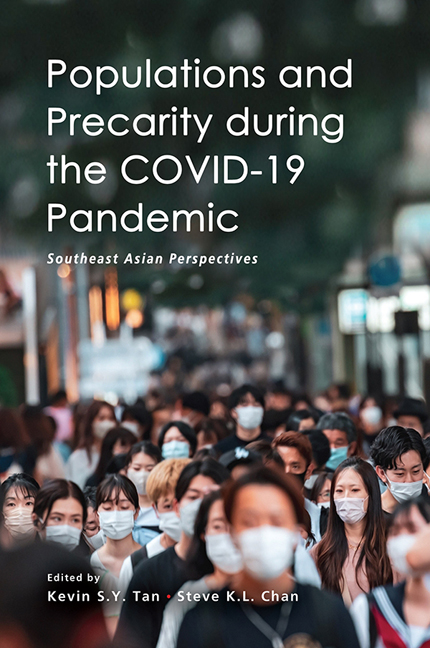Book contents
- Frontmatter
- Contents
- Preface
- About the Contributors
- 1 Introduction: Populations, Precarity and the COVID-19 Pandemic
- 2 Transformation of the Family Structure in Southeast Asia: Trends and Implications
- 3 New Normal, Old Ties: COVID-19’s Social Impact on the Singapore-Johor Bahru Connection
- 4 Unequal Flows: Examining the Factors Surrounding Thai and Vietnamese Labour Migration to South Korea
- 5 Emplacing Multiculturalism: Southeast Asian Migrant Linguistic Acculturation Programmes and Community Building in South Korea
- 6 “Foreign Talent” in Singapore and Some Implications for Schools
- 7 Managing Disaster Risk and Enabling Social Protection in Thailand: Some Lessons from the COVID-19 Pandemic
- 8 Transnational Housing Insecurity: Mobility, Homelessness, and the COVID-19 Pandemic
- 9 Older Persons with Hearing Disabilities in Indonesia: Vulnerability and Demographic Diversity during the COVID-19 Pandemic
- Index
Preface
Published online by Cambridge University Press: 01 March 2024
- Frontmatter
- Contents
- Preface
- About the Contributors
- 1 Introduction: Populations, Precarity and the COVID-19 Pandemic
- 2 Transformation of the Family Structure in Southeast Asia: Trends and Implications
- 3 New Normal, Old Ties: COVID-19’s Social Impact on the Singapore-Johor Bahru Connection
- 4 Unequal Flows: Examining the Factors Surrounding Thai and Vietnamese Labour Migration to South Korea
- 5 Emplacing Multiculturalism: Southeast Asian Migrant Linguistic Acculturation Programmes and Community Building in South Korea
- 6 “Foreign Talent” in Singapore and Some Implications for Schools
- 7 Managing Disaster Risk and Enabling Social Protection in Thailand: Some Lessons from the COVID-19 Pandemic
- 8 Transnational Housing Insecurity: Mobility, Homelessness, and the COVID-19 Pandemic
- 9 Older Persons with Hearing Disabilities in Indonesia: Vulnerability and Demographic Diversity during the COVID-19 Pandemic
- Index
Summary
The origins of this edited volume stem from a two-day online webinar series on Managing Demographic Change in Southeast Asia: Challenges and Issues amidst the ‘New Normal’, which was held from 19–20 November 2020 and hosted by the ISEAS – Yusof Ishak Institute.
At that time, the COVID-19 coronavirus had already spread throughout many parts of the world, and the situation declared a pandemic. It was something that many people had not experienced before, especially its wide-reaching global nature. Few communities, if any, were spared the impact of the pandemic. Within the span of a year, the pandemic not only claimed thousands of lives, but also closed international borders, disrupted air travel between countries and devastated the livelihood of countless others in societies all around the world.
The abovementioned workshop, therefore, not only provided a timely and important platform for a dialogue on the complex and multifaceted demographic issues emerging across Southeast Asia, but also connected them to the challenges of the COVID-19 pandemic on various communities and the lived experiences of many persons living in the region.
By 2022, however, it seems that the pandemic has been gradually receding. With increasing numbers of persons having been vaccinated against the COVID-19 coronavirus, many countries are gradually reopening with the resumption of international travel. Although there is more progress to be made in the fight against the pandemic, there has been a growing but cautious sense of hope that perhaps the worst is over. Many countries in Southeast Asia have reopened their borders with the recognition that the virus is considered “endemic” as part of a broader narrative of the “new normal” in a post-COVID-19 world.
This edited volume is, then, an important scholarly response to discussing the outcomes and potential futures that will result from such a “new normal”. Combining selected papers from the abovementioned webinar series, along with invited authors, a key theme that has emerged is the concept of precarity and its relationship with various populations throughout Southeast Asia. With the ongoing realities of social inequality and cultural diversity that many societies face, the COVID-19 pandemic has exacerbated the uncertainties that many encounter in all aspects of everyday life.
- Type
- Chapter
- Information
- Populations and Precarity during the COVID-19 PandemicSoutheast Asian Perspectives, pp. vii - viiiPublisher: ISEAS–Yusof Ishak InstitutePrint publication year: 2023



